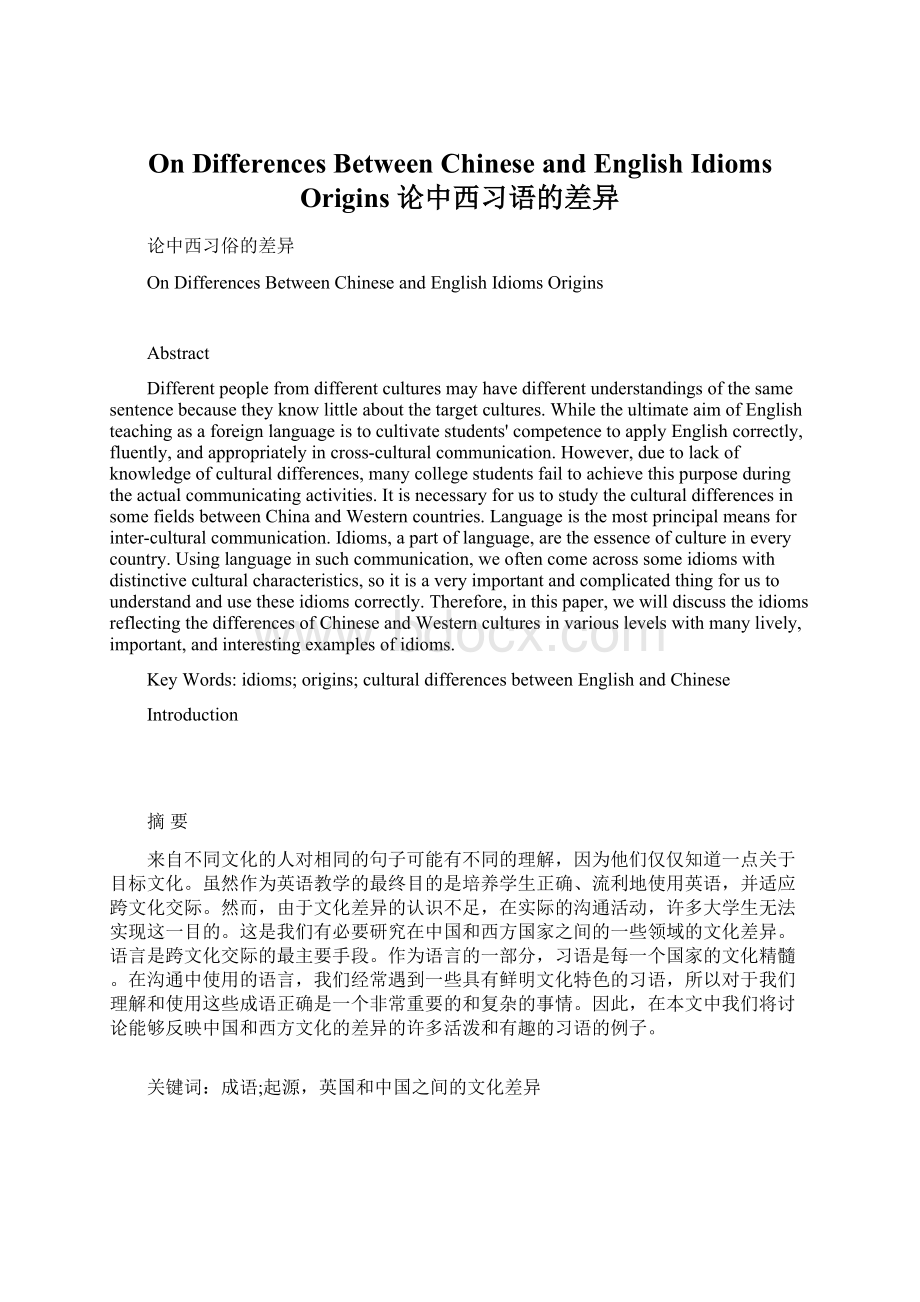On Differences Between Chinese and English Idioms Origins论中西习语的差异.docx
《On Differences Between Chinese and English Idioms Origins论中西习语的差异.docx》由会员分享,可在线阅读,更多相关《On Differences Between Chinese and English Idioms Origins论中西习语的差异.docx(10页珍藏版)》请在冰豆网上搜索。

OnDifferencesBetweenChineseandEnglishIdiomsOrigins论中西习语的差异
论中西习俗的差异
OnDifferencesBetweenChineseandEnglishIdiomsOrigins
Abstract
Differentpeoplefromdifferentculturesmayhavedifferentunderstandingsofthesamesentencebecausetheyknowlittleaboutthetargetcultures.WhiletheultimateaimofEnglishteachingasaforeignlanguageistocultivatestudents'competencetoapplyEnglishcorrectly,fluently,andappropriatelyincross-culturalcommunication.However,duetolackofknowledgeofculturaldifferences,manycollegestudentsfailtoachievethispurposeduringtheactualcommunicatingactivities.ItisnecessaryforustostudytheculturaldifferencesinsomefieldsbetweenChinaandWesterncountries.Languageisthemostprincipalmeansforinter-culturalcommunication.Idioms,apartoflanguage,aretheessenceofcultureineverycountry.Usinglanguageinsuchcommunication,weoftencomeacrosssomeidiomswithdistinctiveculturalcharacteristics,soitisaveryimportantandcomplicatedthingforustounderstandandusetheseidiomscorrectly.Therefore,inthispaper,wewilldiscusstheidiomsreflectingthedifferencesofChineseandWesternculturesinvariouslevelswithmanylively,important,andinterestingexamplesofidioms.
KeyWords:
idioms;origins;culturaldifferencesbetweenEnglishandChinese
Introduction
摘要
来自不同文化的人对相同的句子可能有不同的理解,因为他们仅仅知道一点关于目标文化。
虽然作为英语教学的最终目的是培养学生正确、流利地使用英语,并适应跨文化交际。
然而,由于文化差异的认识不足,在实际的沟通活动,许多大学生无法实现这一目的。
这是我们有必要研究在中国和西方国家之间的一些领域的文化差异。
语言是跨文化交际的最主要手段。
作为语言的一部分,习语是每一个国家的文化精髓。
在沟通中使用的语言,我们经常遇到一些具有鲜明文化特色的习语,所以对于我们理解和使用这些成语正确是一个非常重要的和复杂的事情。
因此,在本文中我们将讨论能够反映中国和西方文化的差异的许多活泼和有趣的习语的例子。
关键词:
成语;起源,英国和中国之间的文化差异
Outline
Introduction
1.Differentlivingcircumstance
1.1Geographicalenvironment
1.2Climate
2.Differenthistoricalallusion
2.1Historicalevents
2.2Fablesandmythologies
2.3Literaryworks
3.Differentreligionsandbeliefs
4.Differenttraditionsandcustoms
4.1Foodandcooking
4.2Animals
Conclusion
得分|
OnDifferencesBetweenChineseandEnglishIdiomsOrigins
Introduction
Languageisinseparablefromculture.Foronething,languageisapartofcultureandplaysanimportantroleinit.Foranother,asamirrorofculture,languageisstronglyinfluencedandshapedbyculture;meanwhile,itreflectsculture.Idiomsincludemetaphoricalphrases,slang,colloquialism,proverbandsoon.Asanessentialpartofthelanguageandcultureofasociety,idiomsarecharacterizedbytheirconciseexpressions,richandvivid,involvinggeography,history,religiousbelief,livingconventionsandsoon.Theyareusuallyhighlyspecializedinmeaningandcloselytiedtodistinctiveculturalfeaturesandculturalattitudes.Itisbelievedthatidiomsarethemostculturallyloadedelementinanylanguage'svocabulary.Undoubtedlytheyareoftenhardtounderstandandhardertousecorrectly.EnglishandChineseidioms,closelyrelatedtotheirownculture,conveydifferentculturalfeaturesandmessagesoftheirownnation,reflectingtheirownculture.[1]P281-282ThereexistsvastdifferencebetweenEnglishandChinesecultureandthisdifferenceoccursinEnglishandChineseidioms,too.Basedonothers’research,thispaperintendstoexploreitbyfullyanalyzingthemainculturalreasonscausingidiomaticexpressionsdifferencesinbothChineseandEnglish.
1.Differentlivingcircumstance
Thatcultureisdeterminedbygeographicalenvironmentisasubjectiveviewofgeographicaldeterminism.Itcannotbedenied,however,thatnaturalenvironmentincludinggeographicalposition,climate,ecologicalconditionissomethingthatplayscontributoryroleintheformationofaculture.Peopledwellinginacertainregiontrytoadaptthemselvestothesurroundingssothatlivelihoodcanbemaintained.Asaresult,theirspecialwayofliving,thinkingandbehavingisformedasaside-productoftheirrelationshipwiththeenvironment.
1.1.Geographicalenvironment
Britainisanislandcountry.Peoplewholivealongseacoastandwhoselivelihoodisdependentontheseawillhaveidiomsaboutwater,sailing,islandandfish.Forexample,wespeakinChinese挥金如土,butweshouldrenderitintoEnglishas"spendmoneylikewater".TherearealotofEnglishidiomsaboutship,waterandfish:
"ascloseasanoyster"(守口如瓶),"castananchortowindward"(未雨绸缪),"atsea"(茫然),"tokeepone'sheadabovewater"(奋力图存),"totakethewindoutofsomebody'ssail"(先发制人),"towerone'ssail"(甘拜下风),"infullsail"(全力以赴),"sailunderfalsecolors"(欺世盗名),"halfseaover"(酒喝得太多),"fishbeginstostinkatthehead"(上梁不正下梁歪),"neveroffertoteachfishtoswim"(不要班门弄斧),"dullfish"(枯燥无味的人);"plainsailing"(一帆风顺),"totrimone'ssailtothewind"(见风使舵),"tobeinthesameboat"(同舟共济),"toburnone'sboat"(破釜沉舟),"abigfishinalittlepond"(山中无老虎,猴子称霸王).[2]P110
Ontheotherhand,theHanPeopleliveonland,theybelongtoanagrariansocietythatplacesagriculturalproductionatthetopofthenationalagenda,regardingindustryandcommerceasthenon-essentials.Duringthelonghistoryoffarming,theChineselanguagehasaccumulatedlargenumbersoffarmers'idioms,like二人同心,黄土变金(Whentwopeopleareofthesamemind,evenclaymaybechangedintogold),上无片瓦,下无寸土(aspoorasachurchmouse),人不亏地,地不亏人(Themaster'sfootstepsfattenthesoil),瓜熟蒂落(Thingswillbeeasilysettledwhenconditionsareripe),瑞雪兆丰年(atimelysnowpromisesagoodharvest),五谷丰登(abundantharvestofallfoodcrops),种瓜得瓜,种豆得豆(asamansows,soshallhereap),四体不勤,五谷不分(canneitherdophysicalworknordistinguishricefromwheat).[3]P99
1.2.Climate
Climateisanotherfactorinthelivingcondition.WhileBritainislocatedinwesternhemisphere,withNorthTemperateZoneandmarineclimate,so"westwind"isthesymbolofspring.ThefamousEnglishpoetShirley's"OdetoWestWind"isapraisingsongofspring.SummerinBritainisawarmandcomfortableseason,whichisusuallylinkedwith"lovely","gentle"and"nice".Shakespearecompareslovertoasummerinoneofhispoems,"shallIcomparetheetoasummer'sday?
Thouartmorelovelyandmoretemperate."[4](Shakespeare’sSonnet18)ThewestwindblowsfromtheAtlanticOceanaswarmandgentleasChineseeastwindandbringsvoluminousraintothisarea.SothatBritainaboundsinraincanbeprovedinsomeidiomsconcerningrain:
"tomakehaywhilethesunshines"(趁热打铁),"rainyday"(穷困时期),"torainorshine"(无论如何),"toraincatsanddogs"(倾盆大雨),"asrightasrain"(非常正确),etc.Britainusedtobeknownasacountryoffogpartlyduetothedampnessandwarmnessoftheweatherconditionandpartlytotheairpollutionassideproductoftheindustrialrevolution.Therefore,inEnglishtherearesomeidiomaticexpressionsconcerningfog,suchas"inafog"(云里雾里),and"tohavenotthefoggiestidea"."Springuplikemushrooms"(雨后春笋)maybecomeincomprehensibletoChineselearnerifheisunawarethatthisidiomimpliestherichnessofmushroomgrowinginthewetareainBritainjustas"bamboo"inChinesespecialty,and"asplentifulasblackberries"(黑莓遍地)alsoindicatestheecologicalenvironmentinBritain,forblackberriesareeasilyavailableinEngland.
InChineseculture,"eastwind"is"thewindofspring";springiswarmandcolorful,anditisregardedasthebeginningofalllives.TherearemanyidiomsinChina,whichrefertospring:
春暖花开(inwarmspring,alltheblossomsareinfullbloom.),春意盎然(springisverymuchintheair),一年之计在于春(thewholeyear’sworkconsistsinagoodstartinspring),万紫千红总是春(itisspringwhenthegayestcoloursabound).Springhastheimageofgoodthings,soChinese“春”isusedinsomeidiomstoexpressthis:
满面春风(one’sfaceradiateshappiness),春风化雨(thelife-givingspringbreezeandrain---salutaryinfluenceofeducation).Summerisalwaysconnectedwithextremelyhotortheintenseheat,so赤日炎炎似火烧(theblazingsunscorcheslikefire)、骄阳似火(theburningsunislikeafire)aretermsoftenusedtodescribesummer.
Sodifferentlivingsurroundingsmayproducedifferentidiomsanddifferentculture.
2.Differenthistoricalallusion
Differentcountriespossessdifferenthistoryculture,whichmainlycomprisesallusion,myths,poems,ancientbooksandrecords,etc.Amongthem,allusionisthemostimportant;itreflectsthenationalcharacteristic.Idiomsfromhistoryculturearethegemsofhumanculturalheritage.Itisworthwhileforustolearnthemwell.Therearelotsofidiomscomingfromthehistoricalallusion.Thestructuresoftheseidiomsareverysimplebuttheyhaveprofoundmeaning,sowecannottranslateandunderstandtheseidiomsfromtheliteralmeaning.ThedifferenthistoricalbackgroundsoftheEnglishandChinesepeoplehavetheirdifferentlegendsandanecdotesabouthistoricalfigureswhichhaveprovidedrichandvariedmaterialsfortheiridioms,andconsequentlygiveanationalcolortotheidiomsinthetwolanguages.ItisnecessaryforustolearnandunderstandtheEnglishallusionaswellastheChineseallusion.Itcanenlargeourscopeofknowledge,widenourfieldofvisionanditisusefultolearnabouttheoriginanddevelopmentofEnglishandChineselanguageandliterature.
2.1.Historicalevents
Inmost,ifnotall,languages,peopleembellishtheirspeechorwritingwithreferencestocharactersoreventsfromtheirhistory,thatistosay,idiomaticexpressionsarecloselyrelatedtoacountry'shistory.Taketheaspectoflanguageforexample:
therearealotofidiomsintheChineselanguagewhichcannotfindanequivalentintheEnglishlanguagebecausethehistoryofthetwocountriesarequitedifferent.ManyChineseidiomsarefromtheirownhistoricaleventswhicharewell-knownbyChinesepeople.Forinstance,thefollowingidiomsarefromhistoricaleventsinAncientChina:
风声鹤唳,草